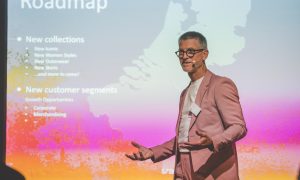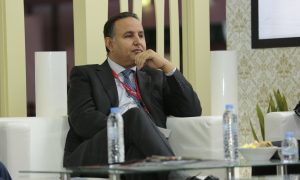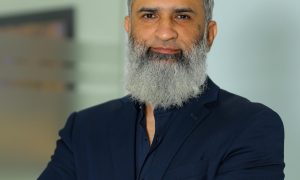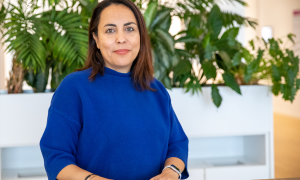You don’t find many global business leaders who have worked in just one company their entire career, especially a 3 billion USD FMCG company. But then again, there aren’t many leaders quite like Emami Limited Director Harsha Agarwal.
Harsha is a second-generation leader, younger son of one of the Emami Group founders, Radhe Shyam Agarwal. He has already been awarded swathes of recognition for his leadership, including being chosen for India’s ‘Forty under Forty list of outstanding business leaders in 2016 by the leading financial daily, The Economic Times. While Harsha is not the only son of a founder to take the reins of a global business, he wasn’t a reluctant heir. He has been dedicated to the family business from a very young age.
“I started coming to the office full-time when I started college. I’d attend my classes at college from six to ten in the morning, go directly to the office and, you know, then be there for the whole day.”
Established in 1974, Emami Limited, the flagship company of the Emami Group, is one of the leading FMCG companies in India operating in personal care and healthcare spaces. The company’s enviable portfolio of over 300 products is based on Ayurvedic formulations, including many household brand names such as BoroPlus, Navratna, Fair and Handsome, Zandu balm, Mentho Plus balm, Fast Relief, and Kesh King.
Emami has a strong network of over 2800 distributors, with products available in 4.5+ million retail outlets across India. The company has a footprint in more than 60 countries globally.
With such a large business to manage, you might expect Harsha to be the fairly top line in his leadership style, but what is different about Harsha is both his depth of customer understanding and his clear strategic knowledge of business trends. For example, his digital marketing knowledge would rival that of any specialist CMO.
In FMCG business, branding and marketing are key pillars. From a really early age, I’ve been lucky to have direct responsibility for both branding and marketing.
Years of staying close to the ever-changing marketing landscape, including the dramatic rise of the digital medium, have sharpened his expertise. Harsha exhibits a unique blend of knowledge, skill, and intuition. “We are all talking about digital-first brands and e-commerce now. This is very, very important for our company, in fact for all companies. We identified this some years back, so we started investing in direct-to-consumer brands. I strongly believe that in the years to come, this will continue to pay dividends.”
Indeed, this digital-first philosophy saved many businesses during the pandemic. Many other businesses, particularly retailers, scrambled to create a digital presence over their mortar bricks-and-mortar model in order to remain relevant.
“This new business model is not a choice that anybody has, but I think it’s a necessity. So that is where I am driving the organisation. I’m putting focus there and partnering with external digital-first brands.”
Supporting a digital-first approach, Harsha has implemented a robust e-commerce sales team. This has positively impacted the bottom line and facilitated the opening of new markets previously untouched by the company. “There are many category segments where we would not have thought to even enter. But now with this e-commerce business model, it is much easier to test the waters and enter new segments.”
Harsha has spearheaded many of the acquisitions that have driven Emami’s phenomenal growth over the years. In 2008, Emami Limited made one of the most historic FMCG acquisitions with The Zandu Pharmaceutical Works Ltd. In June 2015, they made another big-ticket acquisition with the business of Kesh King and stepped into the Ayurvedic hair and scalp care segment. In January 2019, the company also acquired Creme 21, a German brand with strong roots and brand recall.
“In the last 13 to 15 years, we have been very aggressive in the area of acquisitions. I would say we’re one of the most aggressive companies to do large acquisitions in India. The acquisition of Zandu in 2008 was a huge risk because it was not a normal acquisition. It was a company that didn’t want to be sold, but it was a big milestone for me, because I identified the opportunity, convinced my father, then executed the deal.”
For a company that has safely made its way through the global pandemic, it is now focused on the next three to five years, and Harsha has a clear set of plans for the future, starting with his people. “People are our most important asset, so we need to develop how we as an organisation keep upgrading their skills and learnings and retain them so that they become a part of our growth journey.”
The expansion of the digital agenda is also a priority. “This is one area where a lot of growth opportunities are going to come. So we need to build capability, be that in digital marketing, creating digital-first brands, digital selling, analytics to push the business, or automization. We need to think about how to keep and increase our competitive edge.”
“We have some very strong powerful existing brands in niche segments where we are the market leaders. Our focus would be to increase their penetration further to make it more relevant to consumers.”
Another thing he considers important is entering into more partnerships and acquisitions for growth. “It is important to be flexible and enter into a partnership structure which takes care of the interest of both the parties. Optimal use of these partnerships allows us to be present in sectors where it is not always possible for us to be there on our own. Traditional acquisitions in domestic and international markets too is a part of our growth strategy.”
One thing that I think separates us from our competitors is that we have the right mix of professionals and ownership management.
He goes on to say, “I think over the years, we have been able to create the right balance between very, very senior professional people leading each of the functions and capable owner-managers running the business and guiding them. The risk-taking ability of owner-managers is far greater than professionals, and that is where we come in to support the professionals. This correct mix is what separates us from many of our peers.”
Harsha goes on to talk about the customers of each of his brands and the deep understanding that Emami as a company has of them. “We give a lot of importance to consumer insight because we believe the consumer is the reason why we exist.” He talks at length about how every business decision has the customer at the centre. “We are always observing the consumer, finding trends, and seeing how they can be relevant to our business. It may not always be very structured, but it makes us much closer to our customers, I think.”
Emami is also close to its supply chain. When Harsha talks of the Emami family, he includes his partners. The company has a relatively small group of key suppliers relative to its size and turnover, but they are kept close. “It’s the overall relationship, the long-term relationship that matters to us. And the suppliers understand and respect that. We believe in building relationships, trust, and faith in each other. Nurturing that relationship is very, very important.”
Throughout the conversation, Harsha displays the forward focus and ear to the ground dynamism of someone who is fresh into their role. He is different from many long-term leaders in that he has a healthy appetite for change. In fact, he believes change is essential to any business. “I think it’s very important for all companies to understand the change that is happening and adapt to it, accept it, excel in it. Be a part of this change journey and thrive. Otherwise, there are going to be companies that will not last.”
This advice that Harsha gives to other business leaders he also gives to his internal management team. He constantly encourages them to look at things differently and adapt to new things. “Because competition might come in from anywhere. I mean, who thought that the competition for cameras would come from a mobile phone?” Who indeed?
Click here to read & download the full article.

















